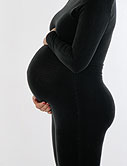
TUESDAY, Feb. 1 (HealthDay News) — HIV-positive teens and young women are more likely to get pregnant and to have pregnancy complications than are those who do not have HIV, a new study finds.
Researchers from Johns Hopkins analyzed the records of 181 HIV-positive female patients, aged 13 to 24, who had been treated at four hospitals over 12 years. More than a third of them became pregnant, some more than once, for a total of 96 pregnancies.
The rate of premature births among the HIV-infected mothers was 34 percent, compared with 22 percent for mothers in the general population, the study reported in the Feb. 1 issue of the Journal of the American Medical Association. Those with HIV who became pregnant also had a higher rate of miscarriage than pregnant women in the general population — 14 percent vs. 9 percent.
Pregnancies occurred in 28 of the 130 females who were infected with HIV at birth and in 38 of the 51 who became HIV-positive through high-risk behavior such as unsafe sex or injection drug use. The pregnancy rate of those infected through high-risk behavior was seven times higher than that of those who were infected with HIV at birth, the study found.
Those who’d acquired HIV through high-risk behavior also had more repeated pregnancies than did those who were infected at birth — 37 percent vs. 14 percent. Females infected at birth were four times more likely to terminate a pregnancy than were those with behaviorally acquired HIV — 41 percent vs. 10 percent.
The findings raise a number of concerns, the researchers said. They show that HIV-infected teens and young adults continue to have unsafe sex and that pregnancies place these already vulnerable young women and their fetuses in serious danger for complications.
The findings also “suggest that teens who were infected with HIV later in life may engage in different sexual behaviors than those infected at birth,” Dr. Kelly Gebo, an infectious disease specialist and the study’s senior investigator, said in a Hopkins news release.
“Further analysis into these differences will help us find ways to prevent unwanted pregnancies and avoid complications from planned ones,” Gebo said.
More information
The American Congress of Obstetricians and Gynecologists has more about HIV and pregnancy.

